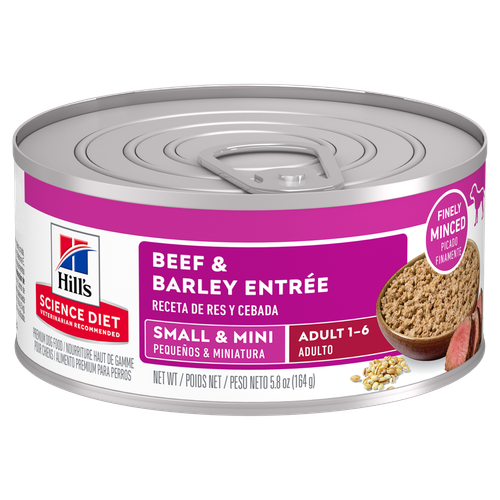
-
Find the right food for your petTake this quiz to see which food may be the best for your furry friend.Find the right food for your petTake this quiz to see which food may be the best for your furry friend.Featured products
 Adult Stomach & Skin Salmon & Brown Rice Recipe Dog Food
Adult Stomach & Skin Salmon & Brown Rice Recipe Dog FoodScience-backed nutrition tailored for skin and digestive health, packed with clinically proven, immune system supporting antioxidants.
Shop Now Adult Sensitive Stomach & Skin Chicken & Barley Recipe Dog Food
Adult Sensitive Stomach & Skin Chicken & Barley Recipe Dog FoodScience-backed nutrition tailored for skin and digestive health, packed with clinically proven, immune system supporting antioxidants.
Shop Now Chicken & Barley Entrée, Beef & Barley Entrée
Chicken & Barley Entrée, Beef & Barley EntréeChicken & Barley recipe and Beef & Barley recipe with precisely balanced nutrition to keep adult dogs active and healthy.
Shop NowFeatured products Adult 7+ Indoor Chicken Recipe Cat Food
Adult 7+ Indoor Chicken Recipe Cat FoodSupports energy level and beautiful fur in mature indoor cats
Shop Now Senior Vitality Adult 7+ Tuna & Vegetables Stew
Senior Vitality Adult 7+ Tuna & Vegetables StewImproves Everyday Ability to Get Up & Go
Shop Now Adult Turkey & Liver Entrée Cat Food
Adult Turkey & Liver Entrée Cat FoodPrecisely balanced nutrition with the delicious taste of minced turkey & liver to help fuel the energy needs of cats during the prime of their life
Shop Now -
Dog
- Dog Tips & Articles
-
Health Category
- Weight
- Food & Environmental Sensitivities
- Urinary
- Digestive
- Joint
- Kidney
-
Life Stage
- Puppy Nutrition
- Adult Nutrition
- Senior Nutrition
Cat- Cat Tips & Articles
-
Health Category
- Weight
- Skin & Food Sensitivities
- Urinary
- Digestive
- Kidney
-
Life Stage
- Kitten Nutrition
- Adult Nutrition
Featured articles What Is Littermate Syndrome? Pet Adoption Guide
What Is Littermate Syndrome? Pet Adoption GuideLearn more about littermate syndrome in dogs and cats and how to successfully navigate adoption and early socialization processes.
Read More How to Properly Mix Wet & Dry Pet Foods
How to Properly Mix Wet & Dry Pet FoodsAn Orange cat eating from a bowl filled with mixed food
Read More The Science Behind Our Love for Pets
The Science Behind Our Love for PetsLearn the scientific reasons why we have such strong connections with our pets, and what science says about the love between humans and our furry friends.
Read More -


What is hyperthyroidism?
The thyroid gland, located in your cat’s neck, uses dietary iodine to make thyroid hormones that help regulate important body functions including your cat’s:
- Metabolism
- Body temperature
- Blood pressure
- Heart rate
- Gastrointestinal (bowel) function

Hyperthyroidism is a common feline endocrine disorder, most often diagnosed in older cats over age 10. Left untreated, hyperthyroidism can have serious, sometimes fatal, consequences on vital organs like the heart and kidneys. The good news is, this disease is highly manageable and can be controlled with proper veterinary care.
If your cat has hyperthyroidism, her thyroid gland will be enlarged and produce excessive amounts of thyroid hormone. Left untreated, hyperthyroidism can have serious, sometimes fatal, consequences on vital organs like the heart and kidneys. The good news is, this disease i,s highly manageable and can be controlled with proper veterinary care.
Warning Signs and Symptoms of Feline Hyperthyroidism
Signs of hyperthyroidism can vary in severity depending on how long a cat has been ill. If your cat exhibits any of the following signs, contact your veterinarian immediately:
- Weight loss
- Increased appetite
- Diarrhea and/or vomiting
- Increased thirst
- Poor skin and coat condition
- Hyperactivity
Cats with chronic kidney disease and diabetes mellitus exhibit some signs similar to hyperthyroidism. Your veterinarian may also need to perform tests for these diseases to ensure an accurate diagnosis. If your cat has hyperthyroidism, her thyroid gland will be enlarged and produce excessive amounts of thyroid hormone.
Managing hyperthyroidism
Four potential options for managing cats with hyperthyroidism are:
- Daily nutrition: limiting dietary iodine intake reduces thyroid hormone production
- Daily medication: anti-thyroid drugs inhibit the production of thyroid hormones
- Radioactive iodine therapy: radiation to treat abnormal thyroid tissue
- Surgery: removal of diseased thyroid tissue


Tasty Tips
Treatment: The importance of nutrition
The food your cat eats plays an important role in her overall health and well-being. Balanced nutrition is an essential part of an active, healthy lifestyle. For accurate diagnosis and treatment options, always consult your veterinarian and ask them to recommend the best food for your cat’s thyroid health.
Check out this video about how Prescription Diet cat food can help.
Thyroid Health Questions to Ask Your Veterinarian
- What does the thyroid gland do and how can it impact the health of my cat?
- What are the different therapy options if my cat has thyroid health problems?
- What factors do you consider before deciding the best way to manage this condition?
- What if my cat has other health issues? How will that affect your therapy recommendation?
- What are the pros and cons of surgery or radioactive iodine therapy?
- How will any potential complications be managed?
- Where will the surgery or radioactive iodine therapy be performed?
- How long before I can bring my cat home?
- What do I need to know when I do bring my cat home?
- Is there a chance the thyroid health problem will come back after either of these procedures?
- If anti-thyroid medication is recommended, how often will I have to medicate my cat?
- What is the best way to administer the medication?
- How long will my cat have to take the medication?
- Are there potential side effects? How can these be managed?
- Can nutrition be used to manage thyroid health problems? Would you recommend a Hill’s® Prescription Diet® cat food for my cat’s thyroid health?
- How do I transition my cat from her current food to the Prescription Diet® cat food?
- Will I have to feed this food for the rest of my cat’s life?
- Can I still give my cat treats? How will other medications or supplements affect the effectiveness of the nutrition?
- Can my other cats eat this food? How do I make sure each of my cats eat the right food?
- How often will I need to bring my cat back to the clinic for check-ups?
- What kinds of things will you be monitoring during these recheck appointments?
- What is the best way to reach you or your hospital if I have any follow-up questions?
- Ask if you need a follow-up appointment
- Ask if a reminder email or notice will be sent
Related products

Supports energy level and beautiful fur in mature indoor cats

Precisely balanced nutrition with the delicious taste of minced turkey & liver to help fuel the energy needs of cats during the prime of their life

Delectable chunks with tender chicken smothered in a rich gravy

Improves Everyday Ability to Get Up & Go
Related articles

Discover how to train your cat, starting with very basic first steps that both reward good behavior and discourage the bad.

Discover which cat toys games your feline friend might like, and how they are great sources of exercise. Explore our library of articles to learn more.

Learn how to litter train a kitten with this guide to potty training, including when to start litter training kittens and troubleshooting tips.

When you adopt a cat, you don't just gain a best friend; you also save her life. Here's why getting a cat from a local animal shelter makes so much sense.

Put your cat on a diet without them knowing
Our low calorie formula helps you control your cat's weight. It's packed with high-quality protein for building lean muscles, and made with purposeful ingredients for a flavorful, nutritious meal. Clinically proven antioxidants, Vitamin C+E, help promote a healthy immune system.
Put your cat on a diet without them knowing
Our low calorie formula helps you control your cat's weight. It's packed with high-quality protein for building lean muscles, and made with purposeful ingredients for a flavorful, nutritious meal. Clinically proven antioxidants, Vitamin C+E, help promote a healthy immune system.


